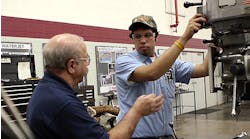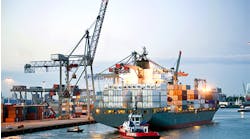An announcement arrived late on a Friday afternoon, one that was newsworthy, though less than exceptional, lately. Ross Aluminum Castings, in Sidney, OH, had been acquired by a holding company, Advanced Metals Group, L.L.C., Malvern, PA. The timing and value of the takeover are not available, and that's not too unusual, either.
What struck me as interesting was this statement: "… Advanced Metals continues to have a strong appetite for acquiring more foundries, particularly those which no longer have a strategic fit with their parent companies."
Metalcasters (and lots of other basic manufacturing companies) have been bought and sold frequently in the past several years, mostly due the arrival of "private equity" investors. The seller of Ross Aluminum Castings was just one of these groups. Charter Oaks Capital bought Ross Aluminum in 2005, and consolidated it with some of its other "holdings" as Revere Aluminum.
The role of private equity has been examined, lauded, and deplored for the past five or six years; depending on whom you ask you'll get a different opinion on the matter. I have opinions on all sides, but on the whole, private-equity investment has been a positive development. These are unsentimental, often unimaginitive, generally impatient investors, but when cash has been needed to support ongoing operations and finance improvements, that cash has frequently been made available by private equity groups. With no particular interest in metalcasting, these investors stay as long as necessary to make a profit. Now, as this announcement and various others make clear, several private-equity investors have decided to move along to new investments.
Even with the spare details of this transaction, the arrival of new ownership reminds us of two things: new money and new ideas. As the private-equity groups have demonstrated, money makes it possible to implement ideas. But, unless an owner is looking to cash out quickly, ideas are the only way to earn new revenue, i.e. money.
This contrast also give us a chance to contemplate the meaning of "value." In the simplest understanding, "value" defines monetary worth, e.g., "Was it worth what they paid for it?" In any sort of a purchase, however, the buyer has to be convinced that there is value beyond what the seller is charging: A first home or an engagement ring make this point fairly well.
Advanced Metals Group is signaling it sees value in Ross Aluminum Castings that Charter Oaks Capital did not see, or no longer saw, and it's in the market for more metalcasting operations that no longer have a " strategic fit" for their owners. It's fair to assume Advanced Metals has some ideas about the strategic fit for Ross Aluminum.
Most of these insights are not new, but they are timely as we present the annual FM&T Where-to-Buy issue. Buying decisions are among the most critical that most metalcasting operators make, and we're confident this issue is the best source for locating the products and services they'll need over the coming year. (We also offer an Online Suppliers Directory at www.foundrymag.com)
This is also a chance for me to remind readers of the essential role that suppliers play in the health and progress of the metalcasting industry. They thrive when the industry thrives, and their new developments typically lead to advances for foundries and diecasters. Producers profit by the quality of their castings, but suppliers profit by the success of their ideas. And so do we all.
The contrast in value between money and ideas is a slight one, distinguished mainly by the care we take with our transactions. Most of us prefer not to discuss money, even though we need it and work hard to gain more of it. We prefer to put the emphasis on new ideas. This is fine, but money and ideas are not interchangeable. Money talks, as the saying goes. Ideas have to be nurtured, shared, and implemented in order for their value to be realized.
In that sense, it's fortuitous that also in this issue we introduce the latest inductee to the FM&T Hall of Honor (see p. 32.) Like all of the members of the Hall of Honor, he is a man distinguished by the ability to inspire others by his ideas, and his example. Naming such people is an important decision we make every year — one that we hope readers will endorse as a fitting tribute to an individual and a continuation of the traditions that animate the metalcasting industry.
Lastly, readers who objected to my recent (August 2007) column on protectionist inclinations in U.S. manufacturing may appreciate an alternative view in this issue (see p. 200). Readers who don't object, or who enjoy the aggravation, may find more of my opinions on the enhanced and redesigned FM&T website, www.foundrymag.com.
Robert Brooks, Editor









